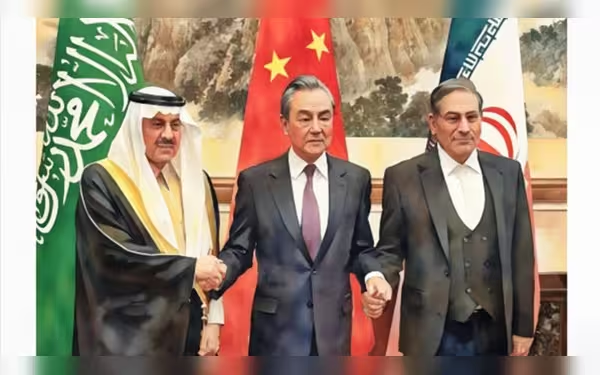Saturday, November 16, 2024 05:58 PM
China's Role in Middle East Tensions and Global Leadership
- China's influence grows amid Middle East conflict.
- Potential global war raises stakes for China.
- China's diplomatic skills tested in crisis.
 Image Credits: thefridaytimes
Image Credits: thefridaytimesChina's emerging role in the Middle East conflict could redefine global leadership and impact international relations.
In recent times, the world has been watching with bated breath as tensions in the Middle East escalate. The conflict, which initially seemed confined to Israel and Gaza, has now drawn in Lebanon and Iran, raising fears of a larger, potentially global conflict. With nuclear weapons in play, the stakes have never been higher. The actions of Israel, fueled by what many see as religious fanaticism and supported by the United States, have set the stage for a confrontation that could involve multiple nations, some of which possess nuclear capabilities.
As the situation unfolds, the role of China as an emerging global power comes into sharp focus. The United States has long dominated the global order, but China is increasingly seen as a challenger to this status quo. While the U.S. portrays China's rise as a threat, China itself emphasizes a narrative of peaceful growth and cooperation. Over the past few years, China has taken on significant leadership roles in various global issues, from managing the COVID-19 pandemic to facilitating diplomatic relations between long-time rivals like Iran and Saudi Arabia.
China's growing influence has made the U.S. wary, particularly as China invests heavily in global infrastructure and multilateral diplomacy. The current crisis in the Middle East presents both risks and opportunities for China. On one hand, the conflict could jeopardize China's interests, alliances, and ambitions on the world stage. On the other hand, if China can navigate this crisis effectively, it may emerge as a global leader, further solidifying its position.
China's energy needs are closely tied to the Middle East, with a significant portion of its imports coming from Iran. An all-out war between Iran and Israel could disrupt these energy supplies, which would have serious implications for China's economy. Although China has alternative suppliers, such as Qatar and the UAE, a major conflict could still have a negative impact, especially as China expands its global trade routes through initiatives like the Belt and Road Initiative (BRI).
However, the current situation also offers China a chance to showcase its diplomatic skills. If China can help prevent the region from spiraling into a catastrophic conflict, it would significantly enhance its global standing. Historically, China has advocated for peaceful resolutions to conflicts, and successfully mediating the Middle Eastern crisis could position it as a viable alternative to the U.S.-led global order.
Yet, the path to peace is fraught with challenges. China must balance its relationships with various countries, including its ally Russia, which may support Iran in the event of a full-scale war. Additionally, China has to consider its relationship with Pakistan, a key partner in the BRI. Pakistan's strategic ties with Iran could complicate matters, as it may lean towards supporting Iran in a conflict.
As the situation continues to evolve, China faces a critical juncture. A global war would force it to abandon its traditional neutral stance and take a definitive position. Failure to do so could undermine its influence and raise questions about its commitments to economic stability and security among its allies.
The ongoing conflict in the Middle East is not just a regional issue; it has the potential to reshape global dynamics. For China, this is a pivotal moment that could either solidify its role as a global leader or set it back significantly. The world watches closely, as the decisions made in the coming days and weeks could have lasting implications for international relations and global peace.













